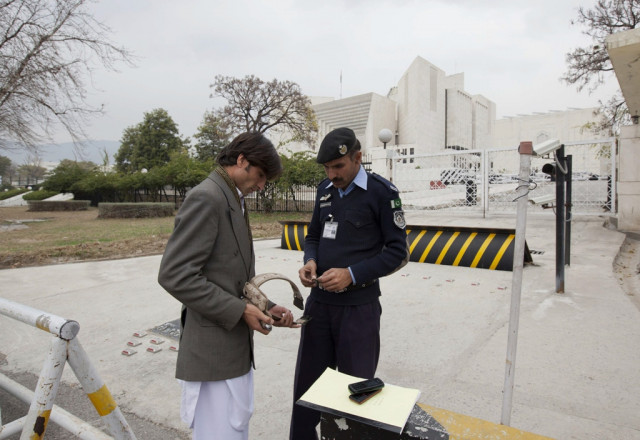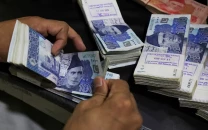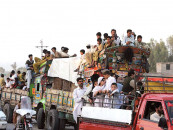In Pakistan, ancient and modern justice collide
Judges have begun to question the decisions handed down by the all-male and usually highly conservative jirgas.

Mohammed Afzal, who petitioned for a reinvestigation into alleged death sentences a Kohistan jirga imposed, is searched by a policeman as he arrives at the Supreme Court on February 14, 2013. PHOTO: REUTERS
Then the provincial high court stepped in and ordered police protection for Bhutto, a human rights activist.
"They told me to pay Rs200,000 to them or get ready to be killed," Bhutto told Reuters, referring to the elders in the village of Ghotki in the southern province of Sindh.
The elders accused Bhutto of having an affair with the woman. Bhutto says she was killed in December for refusing to transfer ownership of her house to her husband.
The case is among a growing number where the judiciary is challenging the centuries-old tradition of quick justice handed down by gatherings of local elders, known as jirgas or panchayats.
In most of the country, jirgas are tolerated but not recognised by the formal courts. Decisions are not legally binding, but are usually enforced by the village.
But in the mountainous tribal regions along the Afghan border, home to millions of Pakistanis, there are no courts and police. Jirgas are the only justice system, and if convened according to the law governing the region, their decisions are legally binding.
Qamaruddin Bohra, head of the Supreme Court's Human Rights Cell, has sat on a jirga himself. They are fair 95 per cent of the time and much better than the courts at enforcing decisions, he said.
"Many times people ignore the ruling of the courts but they cannot ignore the jirgas because that is the decision of their own community," he said. "If they disobey the jirga they might have to leave their village."
But in recent years, judges have begun to question the decisions handed down by the all-male and usually highly conservative jirgas, including some punishments like death, gang-rape or enforced child marriage of girls as young as five.
Those sentences are designed to humiliate the family in retaliation for crimes committed by male relatives.
Such a sentence grabbed world headlines when a village council near the central city of Multan ordered the gang rape of a woman called Mukhtaran Mai in 2002.
Mai was allegedly attacked to settle a matter of village honour, as decided by a panchayat. She was then paraded naked through her village. She brought a case against 14 of her attackers but only one received a life sentence.
Death for clapping
In another such case last year, the chief justice ordered an investigation into alleged death sentences a jirga imposed on five women and two men for appearing in a cellphone video, singing and clapping. The jirga was reportedly incensed by the fraternising between men and women, and deemed it an insult to tribal honour.
The women were killed, a witness to their funerals told Reuters. The two men, who are brothers, are in hiding.
Elders in the remote region of Kohistan denied issuing the death decree and produced four women to meet investigators.
Photographic and other evidence gathered by Reuters showed they probably met impostors. Investigators made no effort to verify their identity.
No national statistics exist on Pakistani jirga decisions challenged in court. But activists say judges are taking on jirgas more frequently, spurred by increased coverage of their rulings as a newly vocal media breaks free of years of stifling military dictatorship.
Activist Samar Minallah Khan has lodged one of two cases currently in the Supreme Court seeking to outlaw jirgas altogether.
Khan says the courts have prevented more than 60 jirga-ordered forced marriages since her case began in 2005. The practice was outlawed in 2004 but remains common.
"Definitely these interventions are increasing, as people hear about successful cases, they feel more comfortable in coming forward to the court or the police," she said.
Yet many Pakistanis support the jirgas, partly because the alternatives are so dismal, says CAMP, an aid group that works with jirgas to make them more accountable.
Two-thirds of people think jirgas are effective, although nearly half think they are sometimes unfair, according to a CAMP survey of 1,500 people across tribal areas in 2010.
Last May, CAMP helped organise a grand jirga in the capital Islamabad to reform penalties.
In a groundbreaking move, the gathering voted to scrap many abusive punishments against women and replace them with fines.
The grand jirga leaders intervened in more than a dozen cases over the next month, said Neha Gauhar, a lawyer with CAMP. In one instance, a man demanding three women to settle an 80-year-old feud got 10 bags of flour and a cow instead.
"We should be training jirga members, not outlawing jirgas," she said.



















COMMENTS
Comments are moderated and generally will be posted if they are on-topic and not abusive.
For more information, please see our Comments FAQ